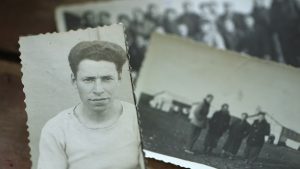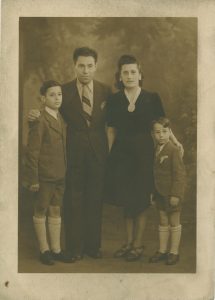Je Reviendrai – a film by Jean Barat
Sunday, May 17, 2020 Sunday, May 24, 2020
from May 17 to 24, 2020, The Shoah Memorial invites you to see or review
«I Will Return»

Je Reviendrai by Jean Barat, 2015, France, 1h07, documentary, produced by J.W Production – Jacques Wenig & Injam Production – Marc Andréani.
Synopsis:
In May 1941, aged 28, Zysman Wenig was arrested in Paris by the French police because he was Jewish and interned at the Pithiviers camp. On June 25, 1942, he was deported to the Auschwitz camp. 70 years later, he tells how he managed to survive four years of internment and deportation. This documentary focuses on the conditions of this survival and on the gaze of a 100-year-old man who looks back at his destiny and that of his family, leading to live one of the greatest tragedies of humanity.
With the participation of the Centre National du Cinéma et de l'image animée and the support of the Fondation pour la Mémoire de la Shoah.
Historical advisor: Annette Wieviorka
Voice: Carlo Brandt
Music by Jean-Noël Yven
About Zysman Wenig

Legend The Wenig family in 1946, Khayé and Zysman with their children Jacques born in 1936 and Roger born in 1940.
Credit: Mémorial de la Shoah/coll. Jacques Wenig
Zysman Wenig was born in Poland on January 15, 1913, in Kònskie near Lodz. The youngest of a family of seven children, his mother and then his father died prematurely. In 1931, Zysman leaves Poland to join his older sister, Sarah, who settled in Paris in the 1920s. He is 17 years old.
Sarah and her husband Moshé have 5 children. Zysman, barely older than the eldest son, integrates the family home in the Marais district and works as a tailor.
On June 30, 1936, he married Khayè Grundman, Moshé’s sister. They had two sons, Jacques born in 1936 and Roger born in 1940.
|
|
During the Occupation, Zysman Wenig was arrested on 14 May 1941 during the so-called 'Billet vert' raid and then interned at the Pithiviers camp. He manages to maintain an often clandestine correspondence with his wife.
On June 25, 1942, Zysman Wenig was deported to the Auschwitz-Birkenau camp in convoy No. 4 and received registration number 42.695. He is notably assigned to a carpentry kommando.
Transferred on 18 January 1945 during the "death marches" to the Mauthausen camp and then to the Ebensee camp, Zysman Wenig was released on 6 May 1945 and repatriated to Paris on 24 May 1945 where he found his wife and children who managed to escape arrest.
|
|
Also to be discovered: Zysman Wenig, Letters to Khayè. Clandestine correspondence of a love in times of war, Calmann-Lévy, 2017.
http://jereviendrai-lefilm.com/
A few words from Jean Barat, director


